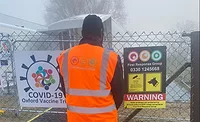COVID-19 Heroes
Broad Institute Security Department supports COVID-19 testing facility
The Broad Institute of MIT and Harvard has served as one of the largest processors of COVID-19 tests in the country. The Security Team has supported these efforts in myriad ways, helping maintain business continuity and ensure campus safety, visitor management, and compliance with COVID-19 safety protocols.
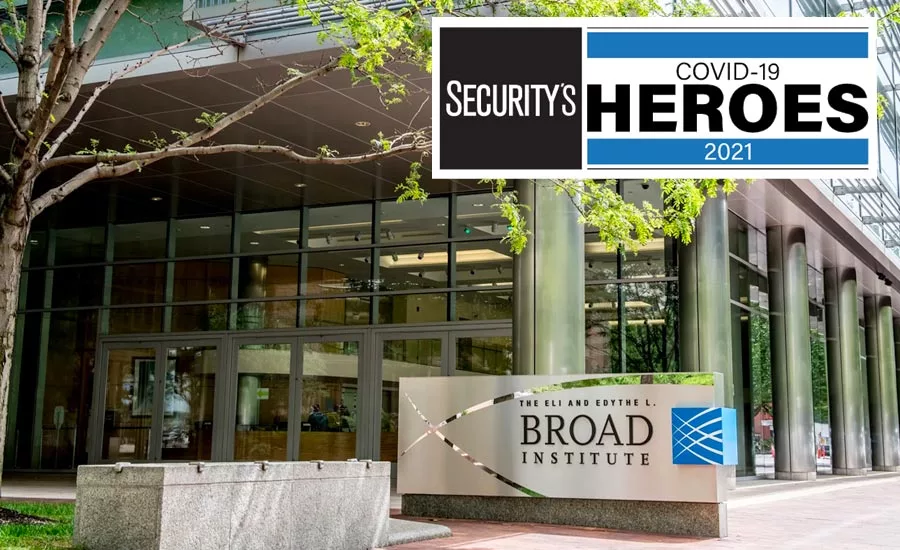
Based in Cambridge, Mass., the Broad Institute of MIT and Harvard is a research organization that convenes a community of researchers from across many disciplines and partner institutions — MIT, Harvard, and Harvard-affiliated hospitals — and aims to improve human health by using genomics to advance the understanding of the biology and treatment of human disease.
Image courtesy of the Broad Institute
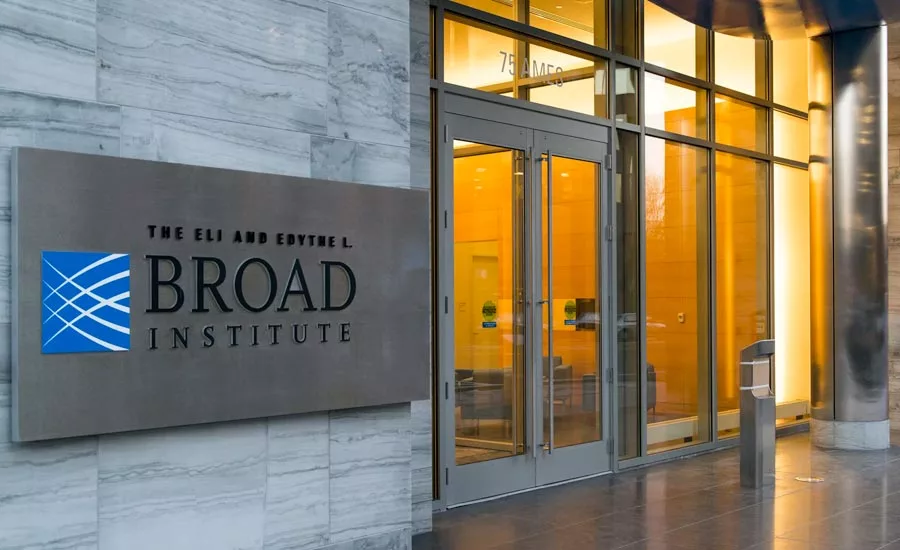
The Broad Institute seeks to better understand the roots of disease and narrow the gap between new biological insights and impact for patients.
Image courtesy of the Broad Institute

David Corbin, Director of Campus Security Operations. Image courtesy of Corbin

Mark Mattar, Manager of Security and Integrated Systems.
Image courtesy of Mattar
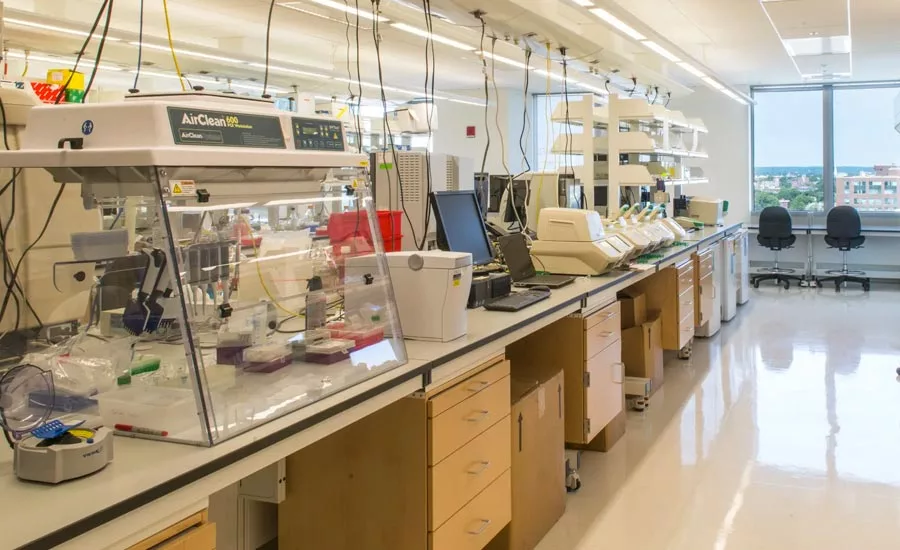
In late March 2020, Broad Institute rapidly converted its large-scale genomics facility into a center that can process SARS-CoV-2 tests. Working in partnership with the Commonwealth of Massachusetts, Massachusetts State Public Health Laboratory, and medical facilities in the Commonwealth, the Broad's CLIA-certified lab processes samples collected from patients in Massachusetts and beyond.
Image courtesy of the Broad Institute
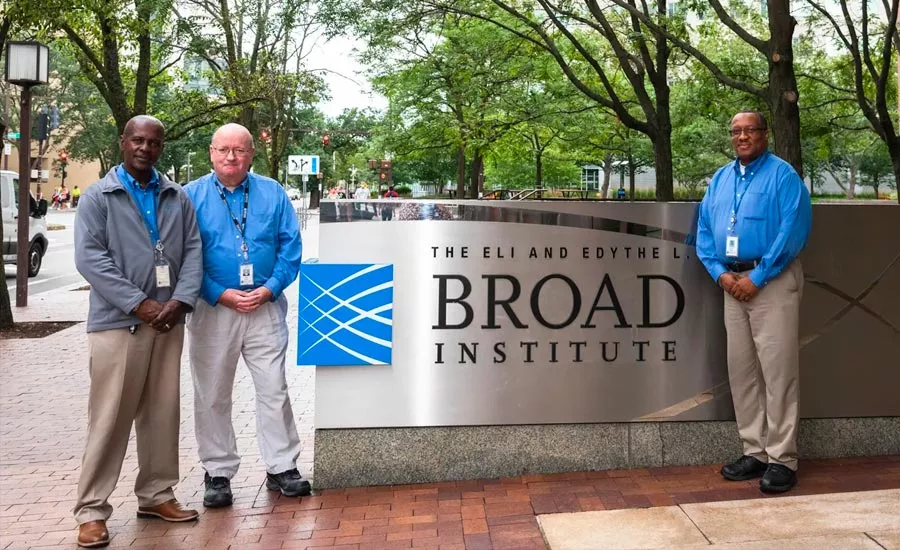
Security Officers David Forde, David Gately, and Ernest Watson.
Image courtesy of the Broad Institute
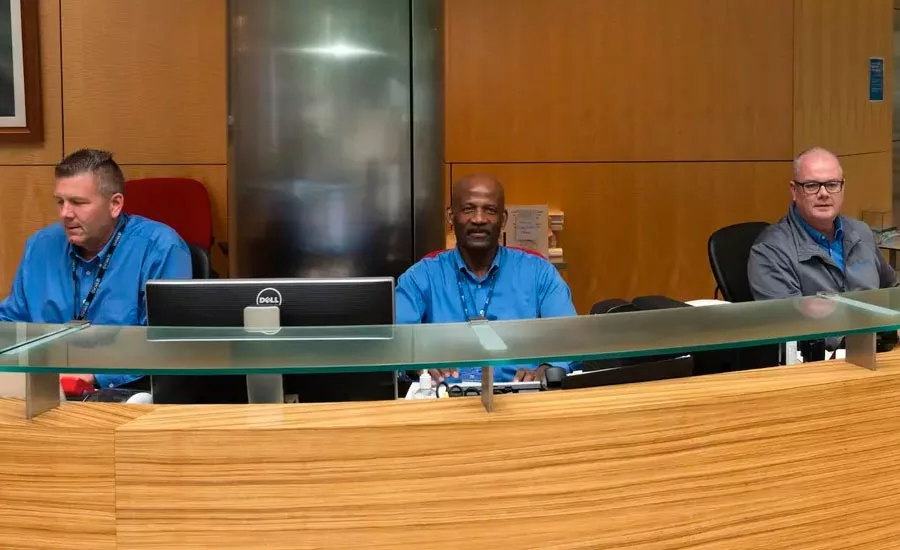
Security Officers Craig Flynn, Frank Davis and Brian Murphy.
Image courtesy of the Broad Institute
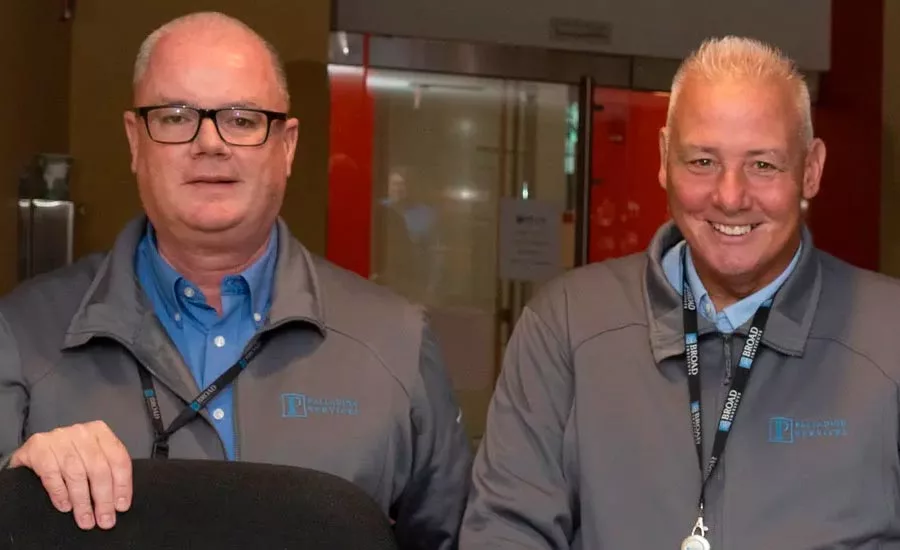
Security Officers Brian Murphy and Thomas Regan.
Image courtesy of the Broad Institute
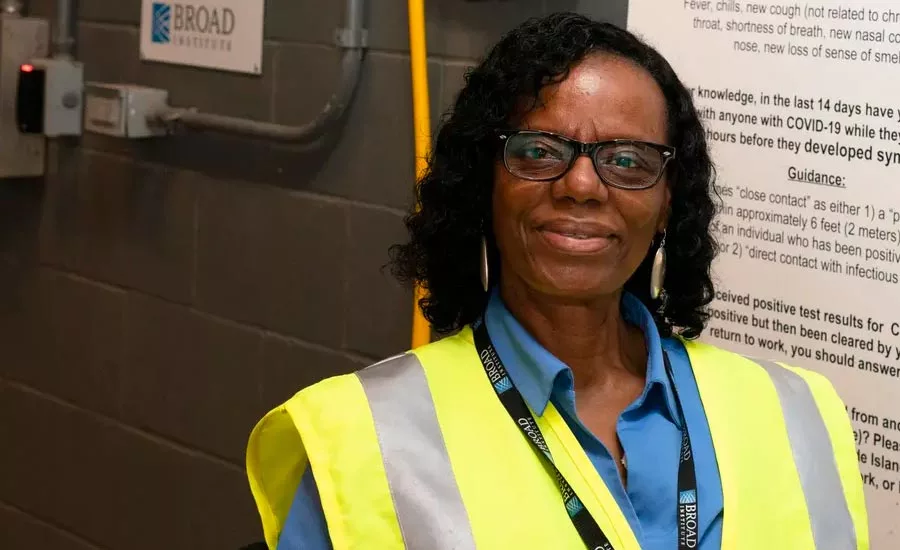
Security Officer Pamelita Kirton.
Image courtesy of the Broad Institute
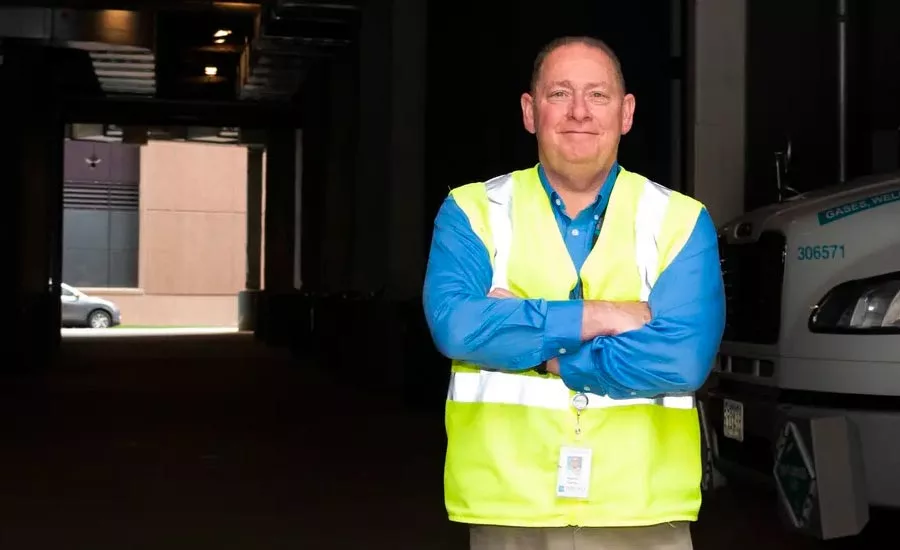
Security Officer Richard Garrity.
Image courtesy of the Broad Institute
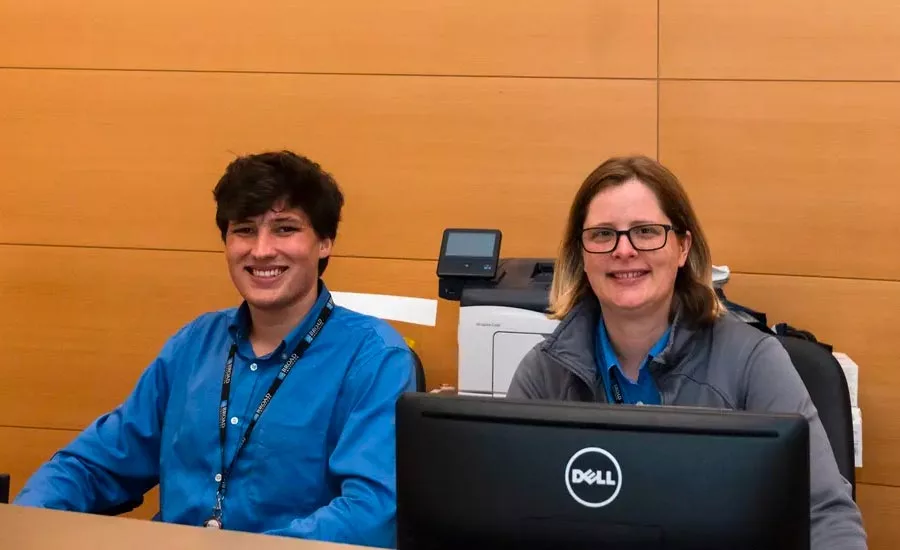
Security Officers Jacob Ott and Carrie Bradley.
Image courtesy of the Broad Institute

Security Officers David Forde and Robert Thomas.
Image courtesy of the Broad Institute
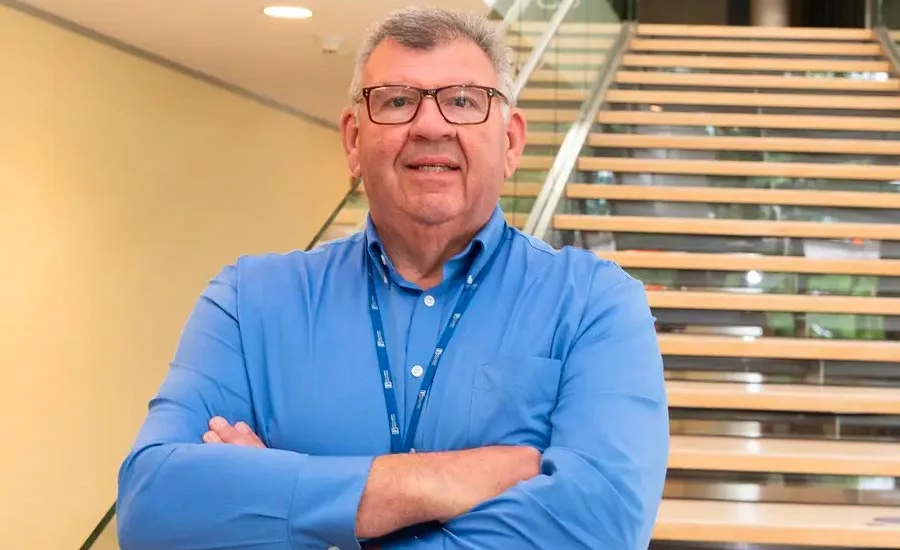
Site Supervisor Paul Lucci.
Image courtesy of the Broad Institute
In late March 2020, before the World Health Organization declared the coronavirus outbreak as a global pandemic, the Broad Institute of MIT and Harvard — a research organization that convenes a community of researchers from across many disciples and partner institutions, such as MIT, Harvard and Harvard-affiliated hospitals — rapidly converted their large-scale genomics facility into a center that processes SARS-CoV-2 tests.
Frustrated with the lack of COVID-19 testing, the Broad Institute reimagined its highly-automated Clinical Research Sequencing Platform, LLC (CRSP) — a CLIA-certified and accredited by the College of American Pathologists — to help increase the capacity for diagnostic testing for COVID-19 in the Commonwealth of Massachusetts.
Within two weeks, the Genomics Platform worked with teams across the Broad Institute to rapidly transform the lab into a high-throughput COVID-19 testing facility, working in partnership with the Commonwealth of Massachusetts, Massachusetts State Public Health Laboratory, and medical facilities in the Commonwealth.
Broad’s facilitates, security, and health and safety teams partnered with the Genomics Platform to shut down most of its standard production work and reconfigured the CRSP space over a single weekend, building walls to isolate work with infectious samples, purchase new protective gear for technicians and implement safety and cleaning procedures to keep workers safe and risk-free.
At the time of publication, Broad Institute has processed and completed 20,156,873 SARS-CoV-2 viral diagnostic and surveillance tests, serving as one of the largest processors of COVID-19 tests in the United States.
The Broad Institute’s Security Team was instrumental in ensuring the success of COVID-19 testing in Massachusetts and beyond, and supported Broad Institute’s efforts in myriad ways, helping maintain business continuity and ensure campus safety, visitor management, and compliance with COVID safety protocols.
The Broad Institute Security Team — a hybrid model consisting of David Corbin, Director of Campus Security Operations, and Mark Mattar, Manager of Security and Integrated Systems, and Palladion Services, its security staffing provider — assisted with on-site business continuity and implemented various safety measures to provide a safe and healthy workplace during the pandemic. In addition, Corbin leveraged his more than 20 years of experience in security leadership, including his background as Director of Police Security and Parking at Brigham and Women’s Hospital in Boston, to help inform business continuity, emergency response and various pandemic-response measures.
“During the COVID-19 response, Mark was instrumental in our response in collaboration with the organization, especially in regards to all the security systems and physical security changes that needed to be made, including the collection and distribution of critical data driving constant changes to security operations, to our Palladion Services security staff and more,” Corbin says.
Corbin, Mattar and the Security Team, led by Site Supervisor Paul Lucci, first focused on enhancing the access control systems and security at the testing facility where all COVID-19 processing was done. Corbin explains, “This enhancement was done in part to assist in screening staff entering the building, and also to aid in the daily health attestations, which staff completed through a web platform developed internally. They result in either a green check mark or a red ‘X’ being displayed on the user’s screen.”
As staff enter the Broad campus and use their card access to enter, they display their health attestation screen, and a green check mark is required for entry. On-site, medical professionals facilitated COVID-19 testing for all staff working on-site up until recently. A negative test is required to work, and a positive test requires isolation, quarantine and automatically prevents staff from obtaining a green check mark on their health attestations.
In addition, all campus perimeter entry points were secured and a single point of entry for each building was established. All entry points are staffed by Palladion Services, LLC, a Boston-based provider of contract security services. “We also added a dedicated security officer in the main lobby, where we received samples for processing from couriers arriving from all over New England and beyond on a 24/7 basis. We received a total of 28,000 courier deliveries from April 2020, to the end of December 2020,” Corbin says.
Because deliveries took place at all hours of the day and night, the Security Team implemented additional measures to secure additional convenient parking nearby to help accommodate a large number of staff who are onboarded to augment existing staff and to handle massive influx of test samples coming their way.
In addition, a new visitor management system and screening protocol was established by Security in collaboration with the Environmental Health and Safety (EHS) team to allow only essential contractors and visitors onto the campus and to ensure appropriate screening along with compliance with COVID safety protocols.
“Mark was previously working on implementing the new visitor management system prior to COVID-19. However, the arrival of the pandemic rapidly accelerated the rollout of the system to provide a consistent, safe approach to screening and approving only essential visitors that absolutely had to be on-site,” Corbin says.
Before being pre-registered in the system, essential visitors had to fill out the health attestation to confirm they were symptom free and had not traveled to COVID-19 hotspots. Upon arrival, Corbin says, security officers in charge of coordinating all pre-visit compliance and screening would corroborate if the visitors were indeed symptom-free and issue visitor badges, along with monitoring mask compliance at all entry and access points.
“We were able to modify the basic functionality of the business management system that we had planned to roll up before, and turn it into a health screening in the pre-registration system,” Corbin explains. “Though it was never designed to support this capability, through Mark’s persistence and ingenuity in collaboration with the EHS team, he was able to pull it off and transform the system to help us ensure compliance with COVID-19 safety policies, secure entrances and keep staff healthy and safe.”
Mattar explains, "We were able to leverage a visitor management system into a pre-screening tool allowing critical third-party support services to complete our required health attestation before even arriving at the Broad."
The Security Team added exit card readers to primary entry/exit points to determine the number of staff on campus at any given time. Using data from these new exit readers and existing entry readers, the Security Team created a weekly density dashboard to help the EHS team and Broad leadership to understand how many people were on-site. This helped to ensure Broad was in compliance with local building COVID-19 occupancy ordinances and to help manage safe occupancy levels, Corbin says. He adds, “The data from the exit readers gave us the ability to conduct contract tracing and further support occupancy density levels. The data was then posted to the virtual dashboard and distributed to key stakeholders.”
With the help of Palladion Services and its additional security staffing, the Security Team was able to support on-site construction personnel screening and compliance, loading dock-screening compliance, and testing site access control and screening. “Palladion Services helped us augment our security and pandemic response, and I consider them to be the heroes of our operations. They flexed their operations to accommodate new virus guidance and prevention measures as they were rolled out, and were true partners with the broader organization.”
Thanks to the collaborative efforts of the EHS team, the Facilities Team, Broad Executive leadership, Genomics Platform leadership, Palladion Services, Lucci, Mattar, Corbin and the Security Team, the Broad Institute has been able to continue the important work of accelerating biomedical research and improving human health, while also serving as a key resource in COVID-19 testing in Massachusetts and beyond.
Broad Institute has been able to team up to not only test at-risk popular COVID-19 hotspots, but also support testing of all residents and staff members at the City of Cambridge’s seven skilled nursing facilities and assisted living facilities; provide regular COVID-19 testing for 108 public and private colleges and universities and their students, faculty, and staff, as part of back-to-school plans; and process pooled COVID-19 tests from students and staff at Massachusetts K-12 schools.
“It was truly a collaborative and thoughtful approach to supporting business continuity, pandemic response, and the processing of more than 19 million COVID-19 tests,” Corbin says.
Looking for a reprint of this article?
From high-res PDFs to custom plaques, order your copy today!




